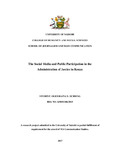| dc.contributor.author | Ogemba, Paul O | |
| dc.date.accessioned | 2018-01-31T09:42:51Z | |
| dc.date.available | 2018-01-31T09:42:51Z | |
| dc.date.issued | 2017 | |
| dc.identifier.uri | http://hdl.handle.net/11295/102992 | |
| dc.description.abstract | This study sought to examine the role of social media in enhancing public participation in the administration of justice in Kenya. The study’s main objective was to examine whether the judiciary can make use of social media as one of the communication channels to promote public participation in the administration of justice in Kenya. The specific objectives was to examine the use of social media in participatory communication in the administration of justice in Kenya; to find out the policies on public participation adopted by the judiciary and to find out the use of social media discussions by judicial offices. The study was anchored in two theories relating to mass communication and democratic rights; the Democratic Participant Theory of Mass Communication and the Connectivism Theory all of which justify the assertion that mass media (social media included) can offer a platform to share and receive ideas between different groups. The study used mixed approach including quantitative and qualitative methods to review literature and conduct primary data collection from 100 respondents divided into two categories, 70 from members of the public and 30 from the judiciary staff. Participants were drawn from Nairobi’s Central Business District, Milimani Law Court and the Supreme Court of Kenya and selected through random sampling and clustering with the data analyzed through classification, coding, editing, use of frequency distribution tables and graphical data presentation. The major findings were that 60% of the entire study population want judicial staff to actively engage members of the public on social media while 83% of the entire study population believes that social media is an important channel to enhance public participation in the administration of justice in Kenya which led to the conclusion and recommendation that if public participation is about receiving and giving information and given that many members of the public especially youths aged 18-35 are users of social media; then it would be necessary for the judiciary to consider and adopt social media as a platform for promoting public participation in the administration of justice in Kenya by developing social media policies to guide interaction between judicial staff and members of the public . | en_US |
| dc.language.iso | en | en_US |
| dc.publisher | University of Nairobi | en_US |
| dc.rights | Attribution-NonCommercial-NoDerivs 3.0 United States | * |
| dc.rights.uri | http://creativecommons.org/licenses/by-nc-nd/3.0/us/ | * |
| dc.subject | Social Media and Public Participation | en_US |
| dc.title | The Social Media and Public Participation in the Administration of Justice in Kenya | en_US |
| dc.type | Thesis | en_US |



